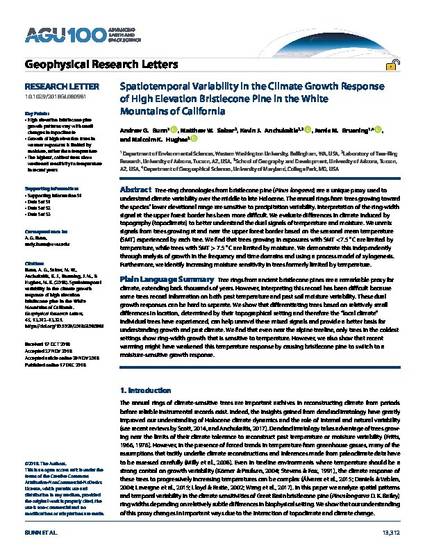
- Tree-ring chronologies,
- Bristlecone pine,
- Moisture-sensitive growth response
Tree-ring chronologies from bristlecone pine (Pinus longaeva) are a unique proxy used to understand climate variability over the middle to late Holocene. The annual rings from trees growing toward the species’ lower elevational range are sensitive to precipitation variability. Interpretation of the ring-width signal at the upper forest border has been more difficult. We evaluate differences in climate induced by topography (topoclimate) to better understand the dual signals of temperature and moisture. We unmix signals from trees growing at and near the upper forest border based on the seasonal mean temperature (SMT) experienced by each tree. We find that trees growing in exposures with SMT ∘C are limited by temperature, while trees with SMT > 7.5 ∘C are limited by moisture. We demonstrate this independently through analysis of growth in the frequency and time domains and using a process model of xylogenesis. Furthermore, we identify increasing moisture sensitivity in trees formerly limited by temperature.
Plain Language Summary Tree rings from ancient bristlecone pines are a remarkable proxy for climate, extending back thousands of years. However, interpreting this record has been difficult because some trees record information on both past temperature and past soil moisture variability. These dual growth responses can be hard to separate. We show that differentiating trees based on relatively small differences in location, determined by their topographical setting and therefore the “local climate” individual trees have experienced, can help unravel these mixed signals and provide a better basis for understanding growth and past climate. We find that even near the alpine treeline, only trees in the coldest settings show ring-width growth that is sensitive to temperature. However, we also show that recent warming might have weakened this temperature response by causing bristlecone pine to switch to a moisture-sensitive growth response.
